How To Boost Revenue With DevOps? Learn 7 Principles Of DevOps
Last Updated on: July 10, 2023

“Agility” is what is essentially required in the present market to survive and thrive.
In the modern tech-changing world, you simply won’t get anywhere if you are not ready to advance your processes according to the current trends. It is true for almost every industry, especially in the case of software development.
This brings us to the most talked about topic ‘DevOps‘.
If you are developing a website or an application, you need agility to speed up the work process, quickly eliminate bugs and errors, enhance team efficiency and implement new updates.
Being agile brings a strategic advantage to both – the company as well as the product, in the short and long run. Implementing DevOps key principles is one of the best ways to be agile and adaptable and thus be more competitive.
Now the question is what are those key principles that result in successful DevOps culture?
In this blog, we will be introducing you with the 7 key principles of DevOps that result in a thriving DevOps culture.
But, let’s first have a look at what DevOps is all about.
What is DevOps?
DevOps is a software development approach that unites the three crucial components; Development, Quality Assurance & Operations. It is a natural extension of Agile methodology that facilitates end-to-end responsibility, cross-functional components and collaboration.
DevOps key principles are geared toward eliminating the “ping-pong” between development and operations departments by fostering tighter collaboration, establishing new communication standards, and promoting smoother integration. Ultimately automating the mundane processes.
To sum up:
- DevOps is a set of practices that help teams build, test and deploy new software more efficiently and accelerate the bug elimination process.
- DevOps brings a set of tools for eliminating ineffective, manual processes and automating zero-value tasks.
All in all, DevOps is a cultural philosophy that promotes smooth collaboration between different departments. This explains why businesses are increasingly adopting DevOps.
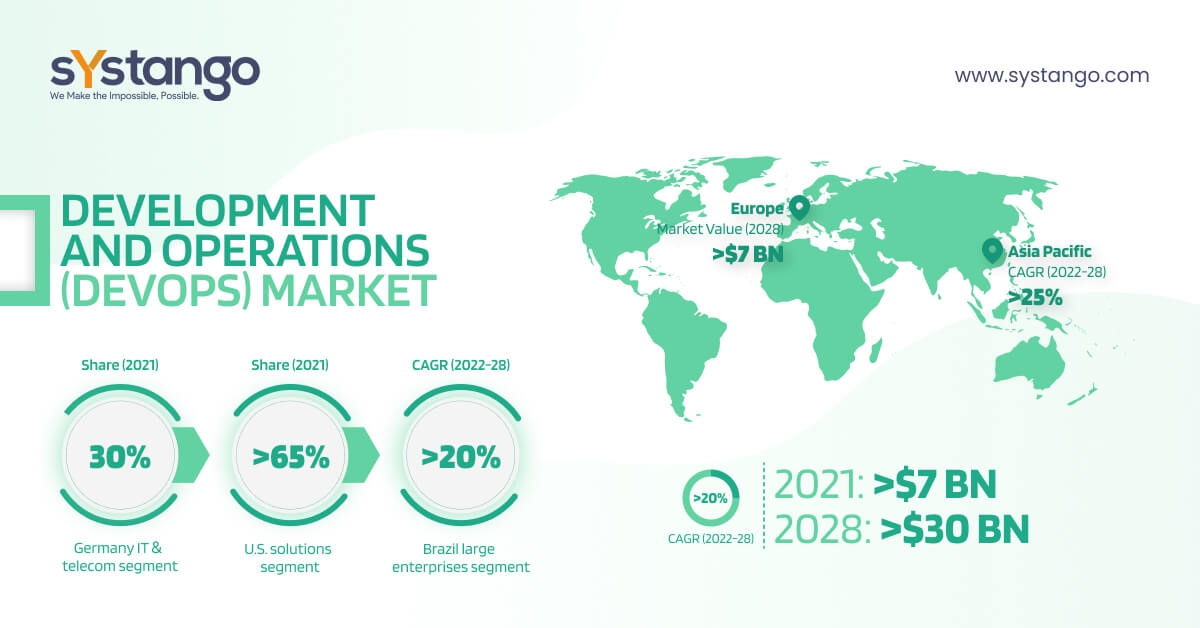
Core Fundamentals of DevOps
Before going through the key principles of DevOps, it is important to understand the core fundamentals of the approach.
Let’s have a look at what 3 things define the core fundamentals of DevOps.
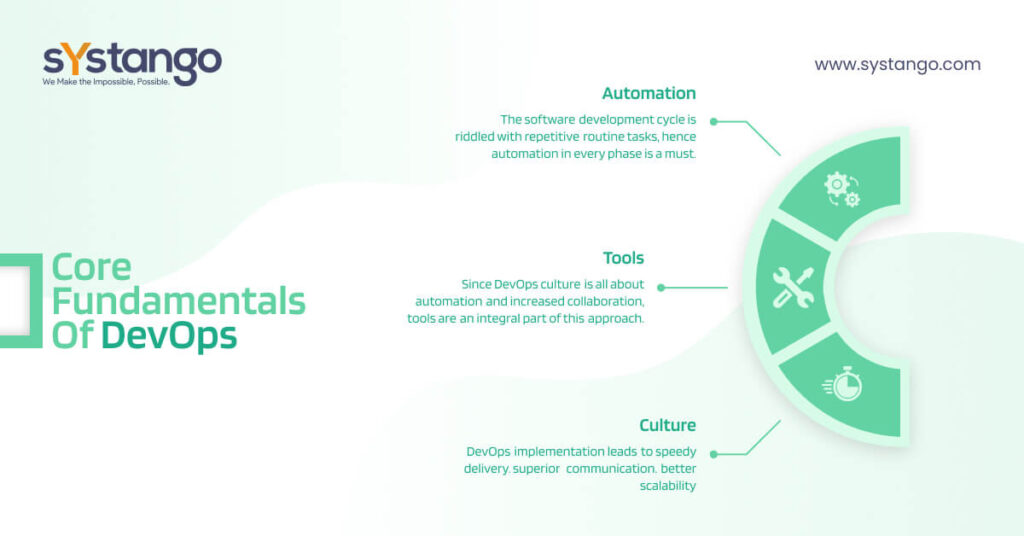
- Automation
The software development cycle is riddled with repetitive routine tasks, hence automation in every phase is a must. It is the first step in making your organization DevOps-rich.
By creating a more efficient workflow, DevOps helps in keeping everything monitored and reported. This decreases manual actions and enables teams to dedicate more time to important things.
- Tools
Since DevOps culture is all about automation and increased collaboration, tools are an integral part of this approach. Your DevOps service provider will select the right set of tools for your organization based on team acceptance, project goals, and cost. At Systango, DevOps Consulting Company, we aid our clients in the speedy implementation of their current processes and reports with the advanced DevOps tools.
- Culture
As mentioned above, DevOps implementation leads to speedy delivery, superior communication, better scalability, process automation and a better environment for technical stability.
DevOps culture thus results in streamlining the software development life cycle at every stage.
7 Key DevOps Principles Businesses Must Embrace
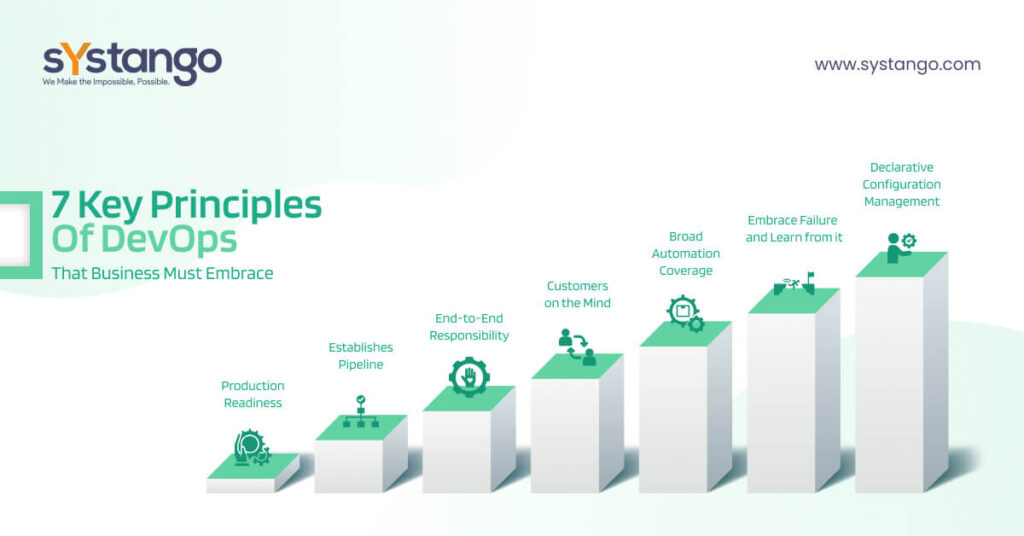
Production Readiness
The fundamental principle behind Continuous Delivery (CD) and quick release of codes are to deliver production-ready releases on demand. Adopting the key DevOps principle of production readiness results in a state where your application code is always ready for production. Production readiness does not essentially mean that that application should be deployed to production regularly, rather it means having the ability to retain the code whenever it is needed.
Numerous benefits can be achieved with continuous delivery or continuous deployment of the code. First of all, it eliminates the risk of downtime and major bugs. Second, it empowers organizations to release high-quality features much easier, ensuring faster time-to-market and reducing the fixed costs associated with the deployment process.
How Systango Can Help You?
- We provide technical consultancy to startups, enterprises, hedge funds, and banks on how to leverage the power of technology
- We offer an end-to-end development team for web and mobile development
- You can hire on-demand tech resources for your development need
Establishes Pipeline
Implementing DevOps establishes a repeatable system – a loop that clears the way for continuity in development. That being so, DevOps creates pipelines that include stages through which code passes before being deployed to production.
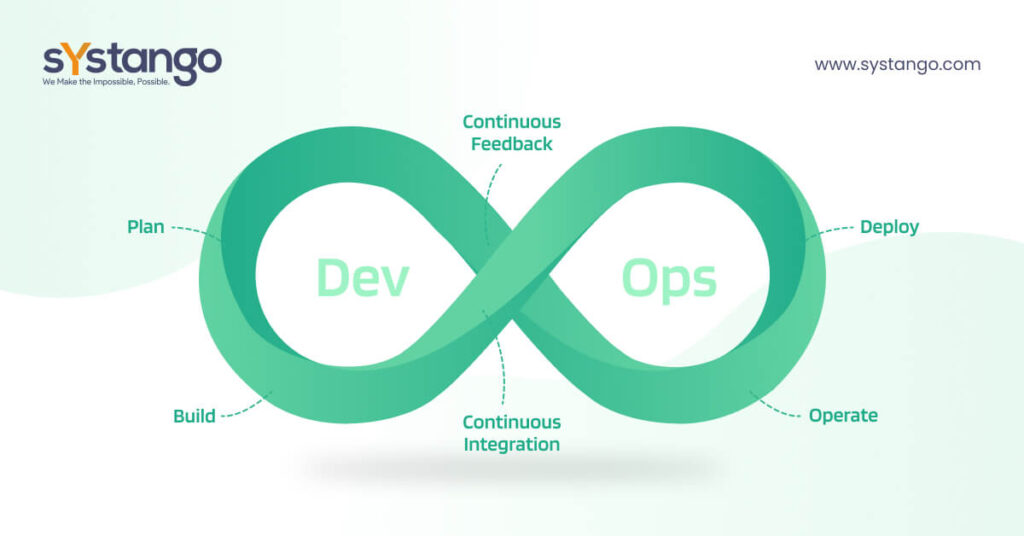
A typical DevOps pipeline consists of the following phases:
- Develop – In this stage, developers write the code.
- Build – Then the team compiles the code into a build that checks for errors.
- Test – After the build phase, the operations team runs a test to make sure that the code is performing as expected.
- Deploy– Once the code has passed the build and test stage, it is deployed to the end-user.
DevOps teams implement critical strategies to achieve a continuous flow of code through the pipeline. The most element of the DevOps pipeline is Continuous Integration (CI) and Continuous Delivery (CD). Continuous Integration includes submitting and merging the code regularly, while Continuous Delivery is all about releasing the tested code to production at the earliest.
End-to-End Responsibility
In the traditional Software Development Life Cycle (SDLC), development and operations teams had different roles and responsibilities. But key principles of DevOps include making teamwork as a single entity that is fully accountable for application from beginning to end. In the traditional approach, developers write the code and the operations team deploys the code which leads to inefficiencies in production as well as performance problems.
In the DevOps setting, both groups are responsible for ensuring product quality and meeting deadlines. It is important to note here that creating this type of inclusive and collaborative environment demands a cultural shift in the company. It is crucial to have stakeholders and development teams on the same page to deliver software solutions that stand to the demand of the client.
Customers on the Mind
DevOps requires brands to behave like lean startups – investing in resources and tools that deliver better results, bringing in more satisfied customers and continuously adjusting to the current market trends. DevOps teams must always strive to meet the needs of ever-changing customer demands. The data gathered from different automated processes must be constantly reviewed to ensure that performance targets are met.
However, to seamlessly deliver customer-centric action, brands must focus on the right set of data. Just because you have got metrics that doesn’t mean that you should focus on all of them. Focus attention on the metrics that matter to your company and your clients.
Broad Automation Coverage
DevOps is all about automating as much part of the software development processes as possible. Hence, making automation one of the critical principles of DevOps. Automating the software development lifecycle lets the workforce focus solely on writing the code and bringing new updates and features.
Anything that is tedious, repetitive and can be automated, must be automated in the DevOps environment. For example, instead of wasting time checking the errors, the DevOps team utilizes different software to automate the process of testing. It is as simple as compiling the source code to find out whether it will work in production. If there are any errors or bugs in the code, tools will trigger an alert making developers find the lines with issues in a blink.
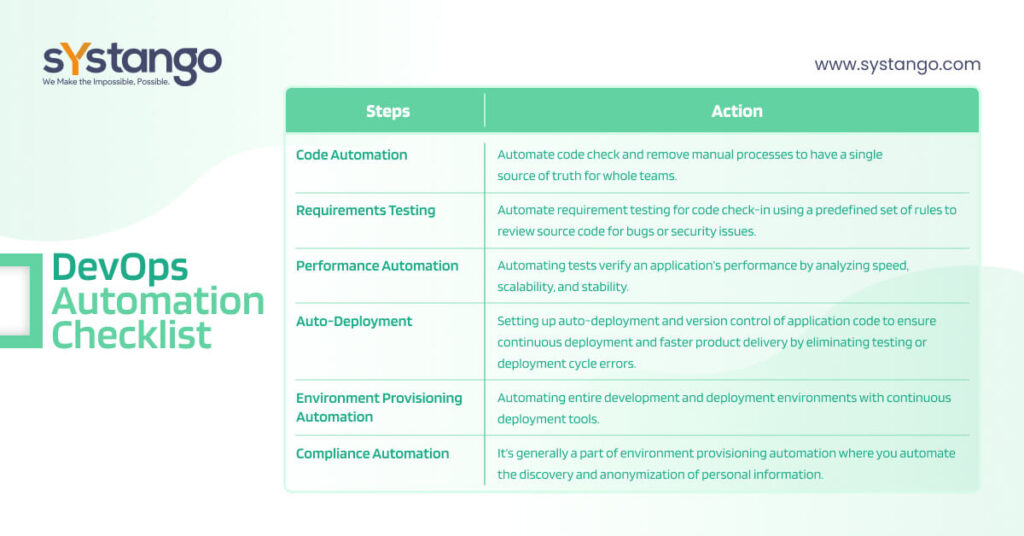
Embrace Failure and Learn from it
Incorporating DevOps principles means brands must change their attitude towards failure. By accepting failure, you cultivate a learning environment that positively impacts the culture of your organization.
Embracing failure also helps you find the ways that make the software delivery process and the product better in terms of reliability, performance and security.
But, here is a red flag – striving to improve is not similar to being a perfectionist. An effective DevOps approach doesn’t mean waiting for code to be perfect before releasing it. Rather, it means bringing new release code early and often and monitoring them to gain insights for improvement.
Must Read: How to hire a DevOps engineer: Here is all you need to know.
Declarative Configuration Management
Declarative management involves writing configuration files that focus on how a software environment should look or how a process should operate. After preparing this, you utilize tools such as the Infrastructure As Code platform to enforce those configurations.
This approach is the opposite of the traditional imperative configuration in which engineers manually configure applications to meet the desired state.
This DevOps principle will bring consistency and scalability to your processes. Once written, a configuration can be applied to as large environments as desired and as many times as needed.
To reiterate, in the present world of quick delivery, customer satisfaction, state-of-the-art services and fast response, DevOps has become an essential enterprise capability. To actualize the business value of DevOps and utilize them in capturing current market opportunities, enterprises need to embrace key principles of DevOps and create conditions for fast, predictable and high-quality software development.
Begin your DevOps Transformation Journey with Systango!
With our DevOps Consulting Services, we have helped large and medium enterprises and even startups achieve higher efficiencies in Development and Operations. As DevOps Service providers, we ensure end-to-end delivery pipelines and continuous integration/development resulting in rapid-on boarding of applications
How Systango Can Help You?
- We provide technical consultancy to startups, enterprises, hedge funds, and banks on how to leverage the power of technology
- We offer an end-to-end development team for web and mobile development
- You can hire on-demand tech resources for your development need
We have varied options depending on your requirements:
- Need a strategic roadmap and action plan rather before aligning DevOps with your services? Avail of our DevOps consulting services and talk to a DevOps expert.
- Want to bridge the DevOps gap through continuous development, continuous integration, continuous testing and deployment? Hire us as your DevOps service providers.
- Planning to integrate existing dashboards and reports with the robust DevOps tools? Talk to our DevOps engineer.
Our DevOps services help you align your development and operations team with your organization’s goal and produce high-quality software. Let’s set up a meeting today!






